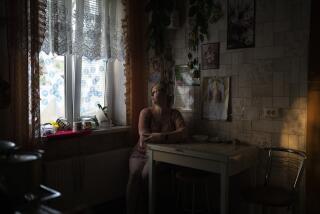Pristina’s Ethnic Albanians Learning to Live in Shadows
- Share via
PRISTINA, Yugoslavia — A pall of black smoke poured from police headquarters in Kosovo’s capital Monday, and ethnic Albanians saw it as a sign to hide indoors or get out of town.
They knew that, by striking at the heart of the police operation that has reduced much of this Serbian province to ruins, NATO had further enraged the Serbs.
In recent days, a dirty war by Serbian forces in the capital’s streets has left at least five more prominent Kosovo Albanians dead. NATO said it had reliable reports that among them were one of the ethnic Albanians’ representatives at failed peace talks in France, and a prominent newspaper editor.
The North Atlantic Treaty Organization’s airstrikes hammered central Pristina into the early hours Monday, destroying the police headquarters and engulfing the complex in flames.
The blaze spread to a barracks where Serbian police officers lived with their families, and many of them--dazed, and blackened by soot--staggered into the nearby Grand Hotel.
More than 20 families living in the barracks are now homeless, the police reported but did not give any casualty figures.
Massive explosions also struck a Red Cross building and the city’s dental clinic. Far from demoralizing police patrolling the capital’s streets, the destruction hardened them.
In Pristina’s ethnic Albanian neighborhoods, where streets were surprisingly busy during the first few days of air attacks, hardly anyone dared go outside after Monday morning’s blitz.
People standing in a bread line on an otherwise empty street turned and scattered down back alleys when two Serbian police armed with AK-47s walked toward them on a foot patrol.
With international monitors out of Kosovo and NATO keeping a safe distance overhead, ethnic Albanians have little protection.
“If ground troops don’t come here, there will be a big catastrophe, believe me,” said a Kosovo Albanian woman, who spoke on condition she not be identified.
There are only about 10,000 NATO troops on standby in neighboring Macedonia, and Western politicians continue to focus on their bombing campaign rather than on introducing ground troops. And Yugoslav President Slobodan Milosevic’s own forces have massed along the Macedonian border, wiring bridges and mountain tunnels with explosives.
As they listen to radio reports in Pristina that Serbian forces are driving as many as half a million people from their homes elsewhere in Kosovo, ethnic Albanians ask: Will we be next?
Although there hasn’t yet been an exodus from Pristina, NATO cited reports that among the dead was Fehmi Agani, an elderly man who was one of the most moderate voices among Kosovo’s ethnic Albanian leaders. He was killed Sunday, NATO said, another victim of Pristina’s death squads.
Agani was on the negotiating team at the Rambouillet and Paris peace talks; when those efforts collapsed, Kosovo’s downward spiral began.
He was killed after leaving the funeral of Bajram Kelmendi, Kosovo’s leading human rights lawyer, who was found slain Friday along with his two sons, ages 16 and 31.
NATO said it also has information that Baton Haxhiu, editor in chief of Koha Ditore, an Albanian-language newspaper, was slain Sunday in Pristina. Serbian authorities considered the newspaper a mouthpiece for the guerrilla Kosovo Liberation Army.
Before this apparent round of “ethnic cleansing,” Western powers sought a peace agreement that kept Kosovo part of Yugoslavia but gave it autonomy. If NATO defeats the Serbs, and Kosovo’s ethnic Albanian refugees are allowed to return home, that now seems impossible.
Behind the violence, many here see the dark hand of a Kosovo-born gangster named Zeljko Raznjatovic--better known as Arkan--who commands a ruthless paramilitary force called the Tigers that was active in Croatia and Bosnia. Arkan has grown rich from his followers’ looting and is married to one of Serbia’s most popular singers.
Serbian civilians walk freely around Pristina, or race around in stolen cars, and police do nothing to rein them in.
Reports of massacres, impossible to verify because the few foreign journalists left in Kosovo cannot travel freely beyond Pristina, continue to come from fleeing refugees and sources still in the province. One source claimed that two families named Popaj and Zhuniqi--which totaled 53 people--were wiped out in a village near Orahovac.
Members of Serbia’s security forces have ordered some ethnic Albanians from their homes in Pristina and then moved in themselves, one resident said.
“They want to hide themselves from NATO bombing, so they are taking cover among the civilians,” she said.
Even as NATO’s cruise missiles and bombs hit Pristina with terrifying force, the biggest fear in ethnic Albanian neighborhoods is that the Serbs will bring the full force of their campaign here.
“We don’t have any arms--nothing--so everyone is afraid,” an ethnic Albanian woman said. “When NATO is bombing, everyone feels safer because they think these killers don’t have time to think about us.”
More to Read
Sign up for Essential California
The most important California stories and recommendations in your inbox every morning.
You may occasionally receive promotional content from the Los Angeles Times.













